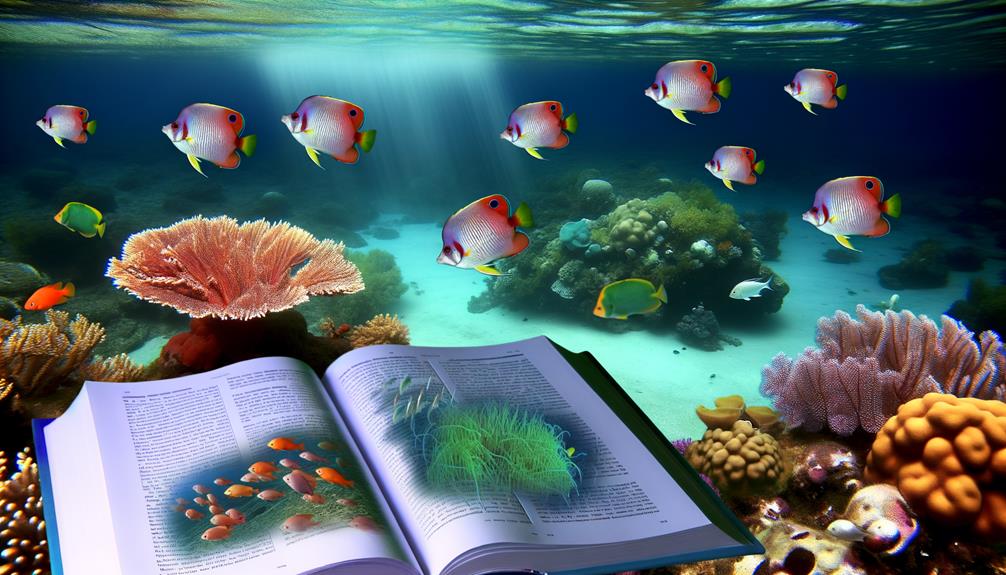This blog contains affiliate links. As part of afiiliate networks and as an Amazon Associate, I earn from qualifying purchases. If you make a purchase through these links, I may earn a small commission at no additional cost to you. I only recommend products and services that I believe in and have personally used or researched. Your support helps me continue to provide quality content—thank you!
You’re on the hunt for the best marine biology textbooks, and you’re not alone! With over 1,300 options out there, it’s essential to find one that fits your needs. You might be looking for an affordable textbook that’s easy on the wallet, or an in-depth guide that covers everything from coral reefs to thermal vents. Perhaps you need a scientifically sound textbook suitable for upper-level students or an easy-to-understand guide for non-biologists. Whatever your requirements, you’ll want to weigh factors like textbook quality, trustworthiness, and relevance to course content. Keep exploring to find the perfect fit for your marine biology journey.
Key Takeaways
- Consider factors like textbook quality, trustworthiness, relevance to course content, author expertise, and online resource availability when choosing a marine biology textbook.
- Affordable textbooks can provide thorough coverage of marine biology at a lower cost, while comprehensive textbooks cover a range of topics, including environmental impact and ocean ecosystems.
- Scientifically sound textbooks provide detailed information, making them suitable for upper-level students, while easy-to-understand textbooks engage non-biologists with topics like coral reefs and thermal vents.
- Comprehensive marine ecosystems textbooks provide a thorough introduction to the intricacies of marine ecosystems, covering the inner workings of marine life from cellular to ecosystem levels.
- Cost-effective options, such as used or older editions, can be a budget-friendly choice, and online resources like interactive simulations and virtual labs can enhance the learning experience.
Marine Biology
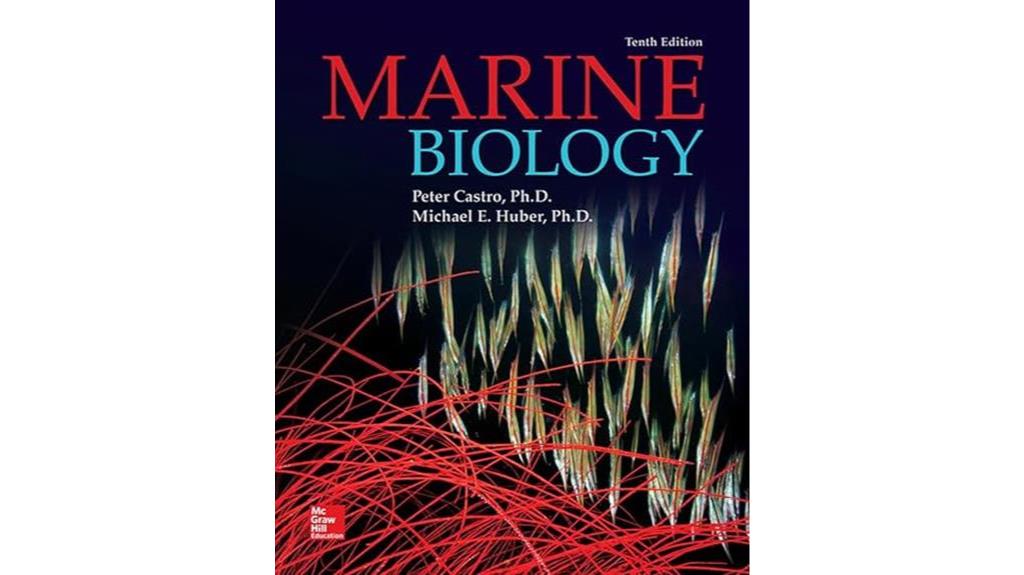
If you’re a student looking for an in-depth and affordable introduction to the fascinating world of marine biology, this textbook is the best choice for you, thoroughly covering the subject matter and saving you a pretty penny in the process.
You’ll fall in love with the book as you explore the interesting subject, and you’ll be glad you did.
The good quality and affordability of this textbook make it a great deal, especially when compared to buying from a local bookstore.
You’ll save a lot of money and still get a thorough education in marine biology.
With this textbook, you’ll get good information to study for your class, and it’ll be worth every penny.
Best For: Students looking for an in-depth and affordable introduction to marine biology.
Pros:
- Provides thorough coverage of marine biology, making it a great study resource for classes
- Offers a more affordable option compared to buying from a local bookstore
- Has good quality and sturdy construction, ensuring it can withstand regular use
Cons:
- Some users have reported receiving used books with stickers on the cover and dirtiness
- The quality of the textbook can vary, with some users receiving poor-quality books
- May not be suitable for everyone, with some users recommending to “buy at your own risk”
Marine Biology

Those seriously interested in marine biology will find this textbook a valuable resource, providing a realistic understanding of the field.
You’ll get a thorough look at the environmental impact of climate change and other factors affecting marine ecosystems.
The book covers a range of topics, from sea worms to ocean ecosystems, and includes scientific data that’s both interesting and necessary for future scientists.
Although it’s not an ideal introductory book, you’ll find it useful for getting a realistic understanding of the field.
You mightn’t find it suitable for casual reading, but it’s perfect for those considering a career in marine biology, like your granddaughter.
Best For: Those seriously interested in marine biology, particularly those considering a career in the field.
Pros:
- Provides a realistic understanding of the field of marine biology
- Covers a range of topics, including environmental impact of climate change and ocean ecosystems
- Includes scientific data that’s both interesting and necessary for future scientists
Cons:
- Not an ideal introductory marine biology book
- Unattractive format with dry diagrams and graphs
- Not suitable for casual reading
Exploring Creation with Marine Biology 2nd Edition, Textbook
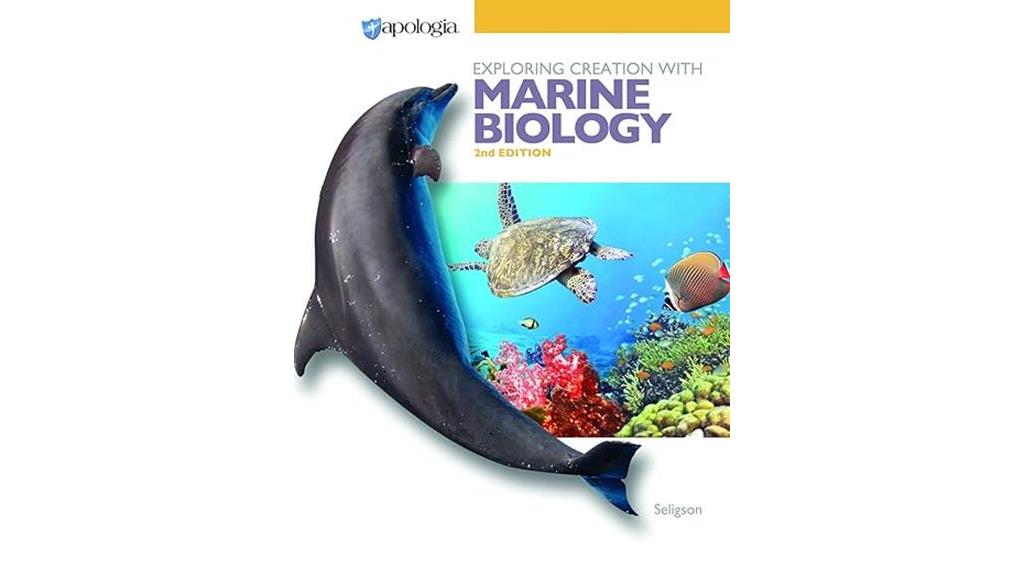
For students seeking a thorough and scientifically sound marine biology course, the Exploring Creation with Marine Biology 2nd Edition, Textbook is an excellent choice, especially for those who’ve had positive experiences with Apologia Science in the past.
You’ll appreciate the scientifically accurate and detailed information, making it a great fit for upper-level students.
However, some users have reported inconsistencies and inaccuracies in the text, which might be a red flag for some.
Additionally, some reviewers felt the book was geared more towards upper elementary levels, rather than upper-level students.
Despite some criticisms, the textbook has its fans, with some praising its engaging content and sturdy binding.
Best For: Students who have had positive experiences with Apologia Science in the past and are seeking a thorough and scientifically sound marine biology course.
Pros:
- Engaging and scientifically accurate content
- Sturdy binding
- Fast shipping
Cons:
- Inconsistencies and inaccuracies in the text
- Geared more towards upper elementary levels, rather than upper-level students
- Misleading test questions and incomplete information
Marine Biology For The Non-Biologist (Marine Life)
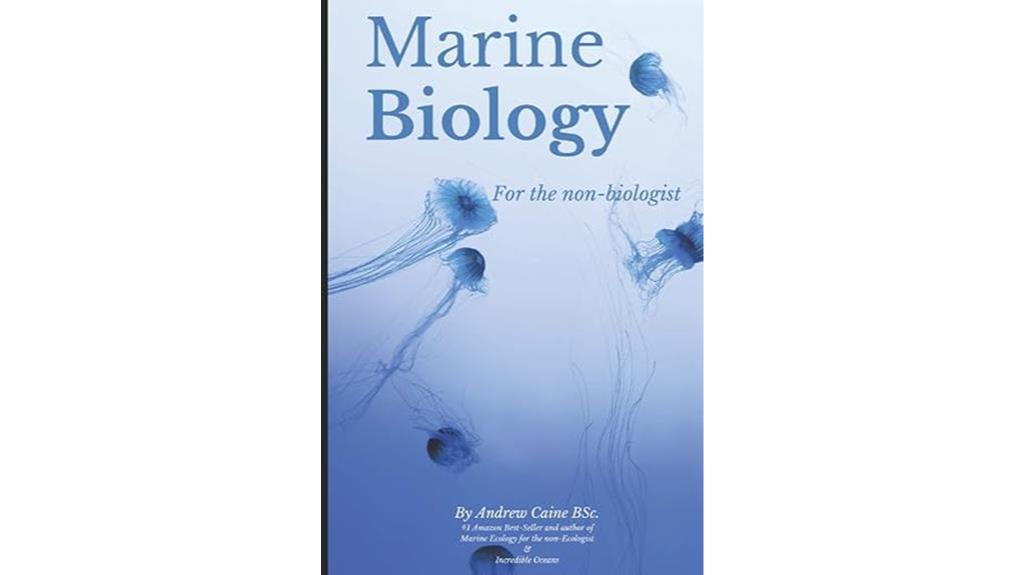
This marine biology textbook is an ideal choice for you if you’re new to the subject and want to explore the fascinating world of marine life, with its engaging and easy-to-understand content making it perfect for non-biologists.
You’ll find it’s a great resource if you’re looking to learn about coral reefs, thermal vents, and polar sea environments, as well as toxins in marine biology.
Many readers, including parents buying for their kids, have found it an excellent introduction to the subject.
While some critics argue the title is misleading or the book lacks structure, the overall consensus is that it’s well-written, easy to understand, and a great starting point for those new to marine biology.
Best For: This marine biology textbook is ideal for non-biologists, students, and parents looking for an introduction to marine biology for themselves or their children.
Pros:
- Engaging and easy-to-understand content makes it perfect for those new to marine biology
- Covers various topics in marine biology, including coral reefs, thermal vents, and polar sea environments
- Well-written and easy to understand, making it a great starting point for those new to the subject
Cons:
- Some critics argue that the title is misleading, and the book may not be suitable for complete beginners
- The book lacks structure, feeling like a collection of statements and facts
- May not provide a clear overview or pedagogical idea, making it difficult to follow at times
Marine Biology: Function, Biodiversity, Ecology
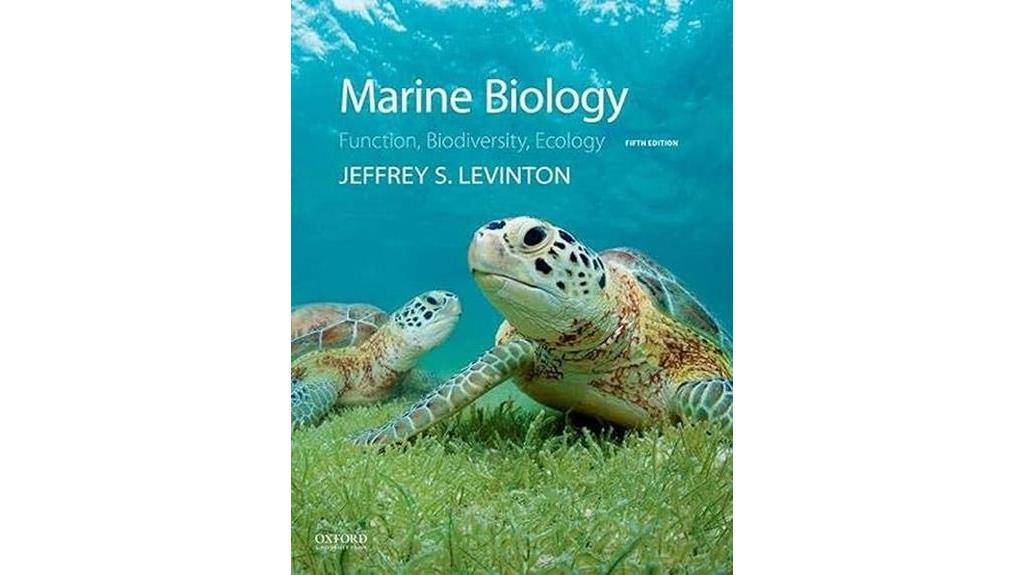
If you’re seeking a thorough introduction to the intricacies of marine ecosystems, marine biology textbooks that explore function, biodiversity, and ecology are your best bet.
These texts will explore the inner workings of marine life, from the cellular level to entire ecosystems.
You’ll learn how marine organisms function, interact, and adapt to their environments, and how biodiversity and ecological principles shape these interactions.
However, be cautious when selecting a textbook, as some may contain errors, such as misrepresenting glycolysis as an anaerobic process.
Additionally, make sure to check the condition of your book before purchase, as some may arrive in poor condition.
By choosing a reliable textbook, you’ll gain an in-depth understanding of marine biology’s functional, biodiversity, and ecological aspects.
Best For: Students and researchers seeking a comprehensive introduction to marine biology, covering function, biodiversity, and ecology.
Pros:
- Provides a thorough introduction to the intricacies of marine ecosystems
- Covers the inner workings of marine life, from the cellular level to entire ecosystems
- Explores how marine organisms function, interact, and adapt to their environments
Cons:
- Some textbooks may contain errors, such as misrepresenting glycolysis as an anaerobic process
- Books may arrive in poor condition, such as with water damage
- Requires caution when selecting a textbook to ensure accuracy and quality
Introduction to the Biology of Marine Life
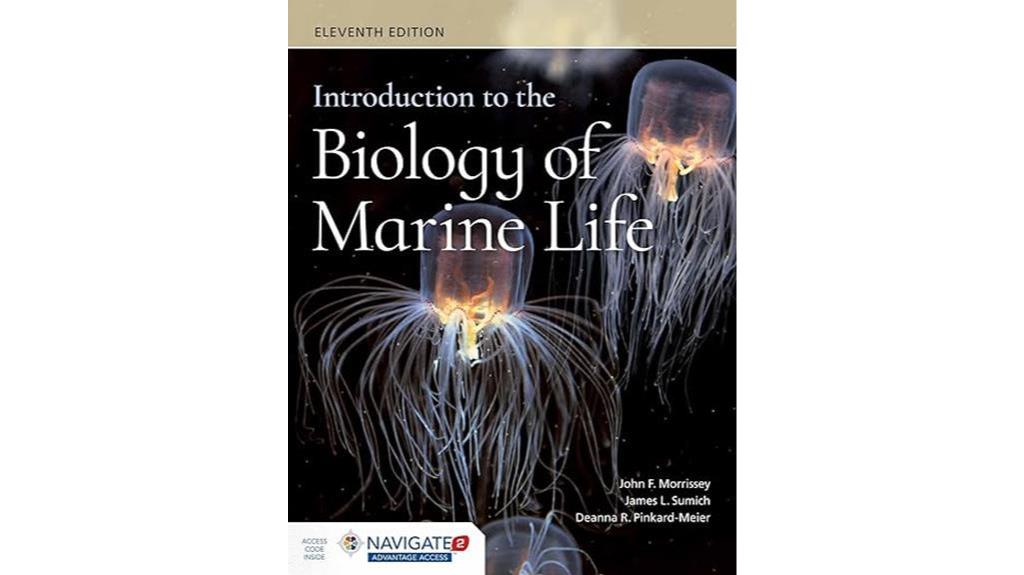
You’ll find the best value in ‘Marine Biology Textbooks‘ when it’s required reading for your university course, as it provides the exact materials needed for your undergraduate Marine Biology class.
You can get it cheaper on Amazon than in your college bookstore, and with Prime, it’ll be delivered in just two days.
If you’re looking to save even more, you can opt for a used copy, but be aware that the condition mightn’t be perfect.
This textbook is a well-written paperback that comes with an access code, making it a great resource for revising material and assignments.
Although some users have reported errors and inconsistencies, it’s still a valuable resource for your Marine Biology course.
Best For: Undergraduate students enrolled in Marine Biology classes who need a required textbook for their course.
Pros:
- Provides exact materials needed for the Marine Biology class
- Cheaper on Amazon than in the college bookstore with quick delivery using Prime
- Well-written paperback that comes with an access code, making it a great resource for revising material and assignments
Cons:
- Errors and inaccuracies in the book
- Inconsistencies and contradictions in the book
- Poor instructor resources, including figures
ISE Marine Biology
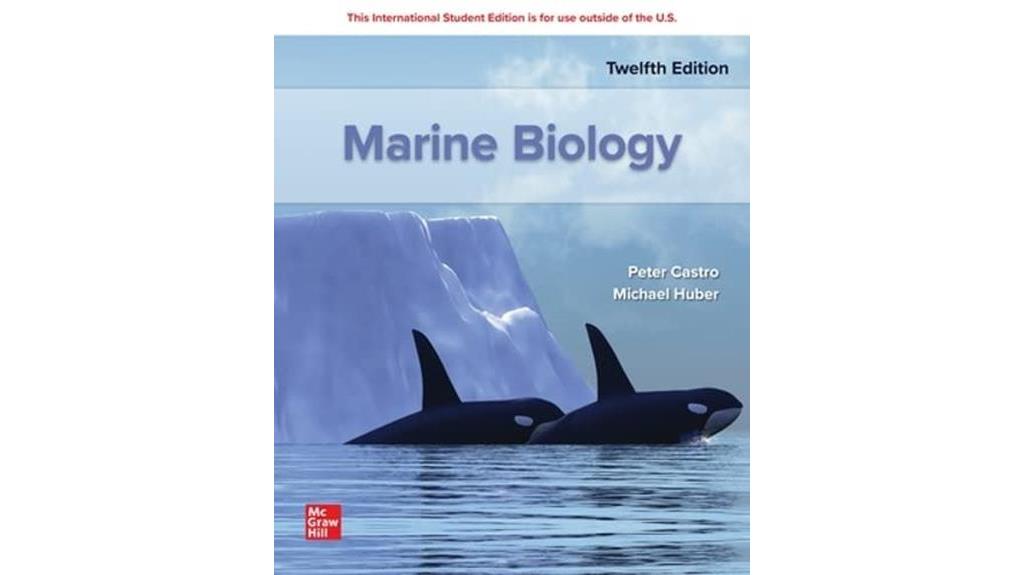
Students on a budget will appreciate ISE Marine Biology, a cost-effective option that’s priced lower than many other $300 college books.
You’ll find it’s a great value, especially when you’re trying to save money on textbooks. The book itself is in great shape, so you don’t have to worry about getting a worn-out copy.
However, keep in mind that you’ll need a companion code for the online course, which isn’t included. You might end up spending an additional $80, like I did for my nephew in college.
Even with the extra cost, ISE Marine Biology is still a more affordable option compared to other marine biology textbooks on the market.
Best For: Students on a budget who need a cost-effective marine biology textbook.
Pros:
- Cost-effective option compared to other college books
- Book is in great shape
- Great value for the price
Cons:
- Companion code for online course is not included
- Additional cost of $80 may be required
- May not be suitable for students who need a comprehensive online course experience
Marine Biology
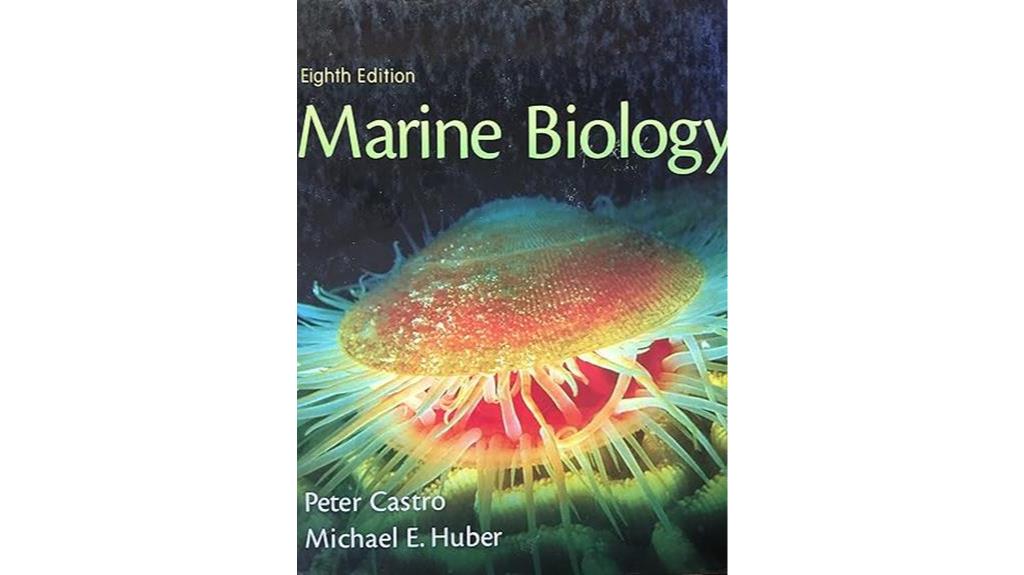
This marine biology textbook is an ideal choice for anyone seeking a thorough and visually engaging introduction to the subject, particularly upper division high school and lower level college students.
You’ll find it’s informative, well-structured, and easy to read, with great use of pictures to illustrate examples.
If you’re interested in marine biology, you’ll love the beautiful pictures of sea life that make the subject enjoyable and easy to understand.
You can use it as a great resource for answering random questions or as a refresher.
Many students have purchased this book for their marine biology class and found it to be a valuable resource, and you can even get it at a lower price on Amazon compared to your school bookstore.
Best For: Upper division high school and lower level college students, as well as anyone interested in marine biology.
Pros:
- Informative, well-structured, and easy to read with great use of pictures to illustrate examples.
- Beautiful pictures of sea life that make the subject enjoyable and easy to understand.
- A great resource for answering random questions or as a refresher.
Cons:
- May not be the actual textbook, but rather a companion book (buyer beware).
- Can be disappointing if not what the buyer expected.
- Delivery may be slow.
Marine Biology 11th Edition
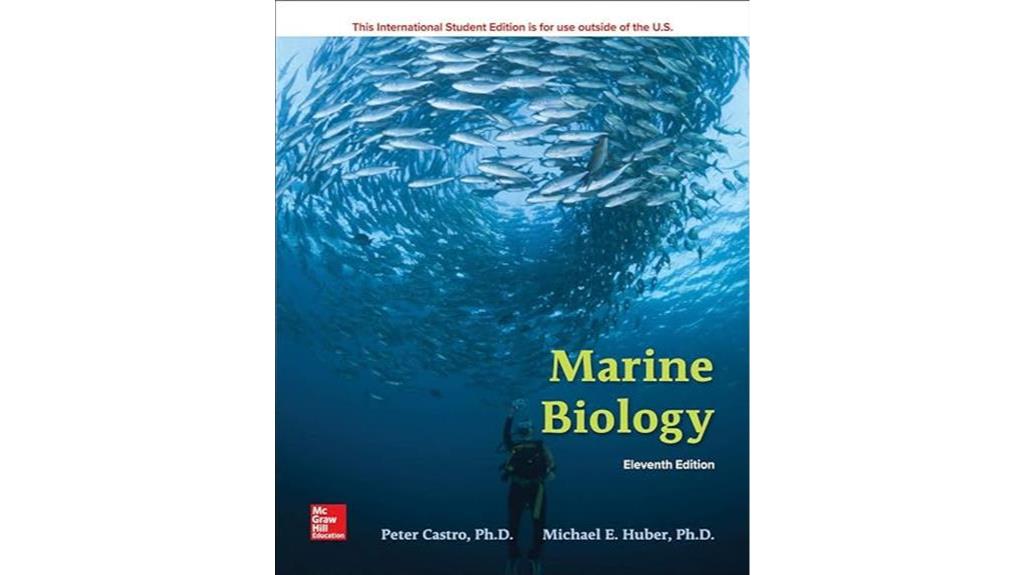
If you’re seeking a thorough and well-organized marine biology textbook that’s easy to follow and suitable for teaching, the Marine Biology 11th Edition is an excellent choice.
You’ll appreciate its perfect organization, which makes it easy to navigate and find the information you need.
The detailed and dense content is well-illustrated, making it informative and engaging for those who know the subject matter.
Plus, the fast delivery guarantees you’ll get your book quickly.
While the thin pages may be prone to tearing, overall, the book is in good condition with no complaints.
With its ease of use and suitability for teaching, the Marine Biology 11th Edition is a great resource for your marine biology studies.
Best For: Students, teachers, and researchers seeking a comprehensive and well-organized marine biology textbook for teaching and learning.
Pros:
- Easy to follow and navigate with perfect organization
- Comprehensive and dense content that is well-illustrated and engaging
- Fast delivery guarantees quick access to the book
Cons:
- Thin pages that may tear easily
Oceanography and Marine Biology: An Introduction to Marine Science
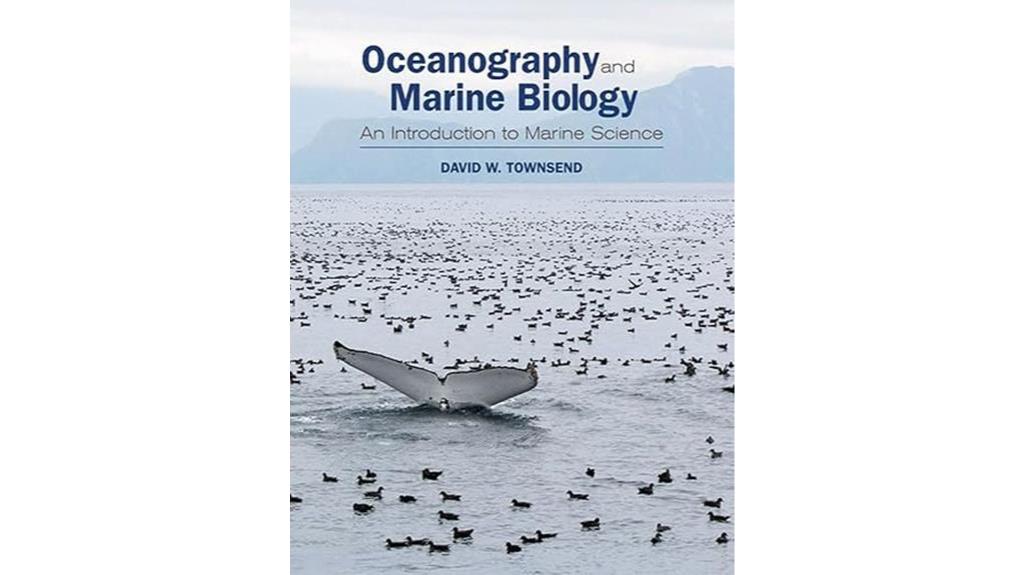
Oceanography and Marine Biology: An Introduction to Marine Science is a top choice for those seeking an in-depth introduction to marine science.
This textbook masterfully covers both oceanography and marine biology in sufficient detail to provide a solid foundation for further learning.
It excels in presenting complex concepts in a clear and concise manner, making it suitable for students of all levels.
The inclusion of mathematical analysis and a ‘Further Reading‘ section in each chapter adds to its value.
As a required textbook for many college courses, you can trust that it’s a reliable resource for your marine biology studies.
With its well-written and illustrated content, you’ll find it easy to master the subject quickly.
Best For: Students of all levels seeking a comprehensive introduction to marine science, particularly those in college courses on oceanography and marine biology.
Pros:
- Masterfully covers both oceanography and marine biology, providing a solid foundation for further learning
- Presents complex concepts in a clear and concise manner, making it easy to understand and master the subject
- Includes mathematical analysis and a ‘Further Reading’ section in each chapter, adding to its value and flexibility
Cons:
- A few minor errors seemed to have escaped the editors
- Some users may receive used books with annotations and notes, even when paying for a new copy
- No other major drawbacks mentioned in the reviews
Factors to Consider When Choosing Marine Biology Textbooks
When choosing a marine biology textbook, you’re not just picking a book – you’re setting yourself up for success in your marine biology course.
You’ll want to weigh factors that impact your learning experience, from the quality of the textbook itself to the expertise of the authors.
Textbook Quality Matters
What makes a marine biology textbook truly effective, and how can you identify one that will support your learning journey?
The quality of your textbook can profoundly impact your learning experience, so it’s vital to choose one that’s well-written, organized, and accurate.
A high-quality textbook should have clear and concise language, making complex concepts easy to understand. Engaging illustrations, diagrams, and photographs can also enhance your learning experience, helping you visualize complex marine biology concepts.
Look for a textbook with a clear and logical organization, where each chapter builds upon previous material, and includes summaries and review questions to reinforce your understanding.
A trustworthy textbook is also free of errors and inaccuracies, with meticulous editing and proofreading to verify the material is reliable.
When choosing a textbook, consider these factors to confirm you’re getting a high-quality resource that will support your learning. By selecting a textbook that meets these standards, you’ll be better equipped to succeed in your marine biology studies.
Relevant Course Content
A marine biology textbook should tackle a wide range of topics, from the environmental impact of climate change and other factors to the intricacies of scientific data and diverse ecosystems like coral reefs and thermal vents.
This thorough approach will guarantee a deep understanding of marine biology.
For an introductory course, a textbook that covers the basics, such as the structure and function of marine organisms, biodiversity, and ecology, would be suitable.
On the other hand, if you’re looking for a textbook for an advanced course, consider one that provides a meticulous and scientifically sound coverage of topics like cellular respiration, glycolysis, and anaerobic metabolic processes.
Selecting a textbook that’s well-structured, easy to read, and includes high-quality illustrations and diagrams to facilitate understanding of complex concepts is crucial.
Remember to choose a textbook that aligns with your course goals and objectives, providing an in-depth overview of marine ecology, biodiversity, and the impact of human activities on marine ecosystems.
Author Expertise Counts
In selecting a marine biology textbook, think carefully about the author’s expertise, as it can profoundly impact the accuracy, relevance, and overall quality of the content.
When you’re evaluating a textbook, look for authors with a strong background in marine biology. These experts can provide more accurate and up-to-date information, as they’re familiar with the latest research and developments in the field.
They can also provide real-life examples and case studies, making the content more engaging and relatable for you. Check if the authors are affiliated with reputable universities or research institutions, as this can indicate their level of expertise and credibility in the field.
Additionally, authors who are actively involved in marine biology research can provide a thorough understanding of the subject. Finally, consider a team of authors with diverse expertise in different areas of marine biology, as they can provide a more well-rounded textbook that covers a wide range of topics.
Condition and Packaging
When buying a marine biology textbook, it’s essential to think about the condition and packaging, as a damaged or poorly packaged book can render it unusable.
You’ve probably heard horror stories about buyers receiving water-damaged books or texts with torn pages. To avoid this, carefully review the seller’s ratings and reviews before making a purchase. Check if they’ve a good track record of packaging books properly to prevent damage during shipping.
Be wary of sellers who advertise their textbooks as being in ‘good’ condition, as this can be subjective. What one person considers ‘good’ mightn’t meet your standards.
When your textbook arrives, inspect it carefully and report any damage or discrepancies to the seller immediately. This ensures a satisfactory resolution and helps you get the most out of your purchase.
Online Resource Availability
As you inspect the condition and packaging of your marine biology textbook, don’t forget to explore the online resources that come with it, as they can greatly enhance your learning experience.
You’ll want to check if the textbook comes with online access to supplementary materials, such as interactive simulations, video lectures, or virtual labs. These resources can help you visualize complex marine biology concepts, making them easier to understand and retain.
Additionally, look for textbooks that offer online quizzes, chapter summaries, or flashcards to help you test your knowledge and reinforce your learning. Some textbooks may also provide online access to instructors’ resources, such as PowerPoint presentations, lecture notes, or test banks. Having these resources at your fingertips can save you time and help you stay organized.
When evaluating online resources, consider how user-friendly the platform is and whether it’s accessible on multiple devices.
You should also check if the resources are regularly updated to reflect the latest developments in marine biology.
Budget and Value
You’ll need to weigh the value of different marine biology textbooks and examine your budget to get the most bang for your buck.
When it comes to budget, there are several options to ponder. Buying a used or older edition of a marine biology textbook can be a cost-effective choice, with prices often markedly lower than the latest edition.
Renting a textbook is another budget-friendly option, with rental periods typically ranging from semester to semester or quarter to quarter.
If you prefer a digital copy, purchasing an e-book version of a marine biology textbook can be a more affordable option than buying a physical copy, with prices often 20-50% lower.
It’s also a good idea to compare prices across different online retailers, such as Amazon or Chegg, to find the best deals. When evaluating the value of a textbook, take into account the cost per page or cost per chapter to make a more informed purchasing decision.

Erzsebet Frey (Eli Frey) is an ecologist and online entrepreneur with a Master of Science in Ecology from the University of Belgrade. Originally from Serbia, she has lived in Sri Lanka since 2017. Eli has worked internationally in countries like Oman, Brazil, Germany, and Sri Lanka. In 2018, she expanded into SEO and blogging, completing courses from UC Davis and Edinburgh. Eli has founded multiple websites focused on biology, ecology, environmental science, sustainable and simple living, and outdoor activities. She enjoys creating nature and simple living videos on YouTube and participates in speleology, diving, and hiking.
🌿 Explore the Wild Side!
Discover eBooks, guides, templates and stylish wildlife-themed T-shirts, notebooks, scrunchies, bandanas, and tote bags. Perfect for nature lovers and wildlife enthusiasts!
Visit My Shop →
